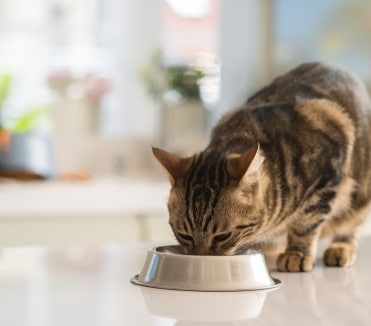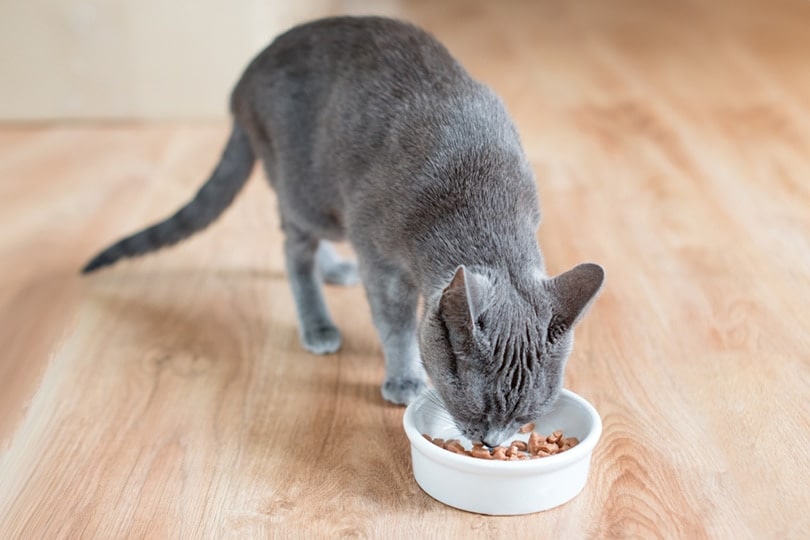
To help you decide which brand to use, we’ve developed reviews of our favorites. Below, we’ll discuss 10 cat food bowls and which characteristics to consider while shopping.

A Quick Comparison of Our Favorites in 2024
| Image | Product | Details | ||
|---|---|---|---|---|
| Best Overall |

|
Hepper NomNom Bowl |
|
CHECK PRICE |
| Budget Buy |

|
Frisco Copper Print Design Bowl |
|
CHECK PRICE |

|
Dr. Catsby's Whisker Relief Bowl |
|
CHECK PRICE | |

|
Frisco Cat Face Ceramic Dish |
|
CHECK PRICE | |

|
OurPets Durapet Premium Bowl |
|
CHECK PRICE |
The Best Cat Food Bowls
1. Hepper NomNom Bowl — Best Overall

| Bowl Size: | 4” L x 5” W x 1” H |
| Bowl Material: | Stainless steel & PP plastic |
The Hepper NomNom Bowl is a two-in-one feeder with several features that give it an edge in the competition for the best overall cat food bowl. The product’s tray has room for two bowls, which are wide and shallow, making them easy on your cat’s whiskers. The slightly elevated plastic tray serves double duty as a placemat to keep food from falling over your floor.
The dishes are made of stainless steel and can be thrown in the dishwasher. Each bowl can hold 10 ounces and can be easily removed from the tray for cleaning. The plastic tray is also dishwasher safe; just make sure to put it on the top rack.
Extra stainless-steel dishes are available if something happens and you need replacements. The Nom Nom Bowl comes in pink, white, and gray to match your decor.
At Catster, we’ve admired Hepper for many years and decided to take a controlling ownership interest so that we could benefit from the outstanding designs of this cool cat company!
- Slightly elevated design
- Wide, shallow bowls to give whiskers room
- Dishwasher safe
- Some cats may not like double feeders
2. Frisco Copper Print Design Stainless Steel Dog & Cat Bowl — Budget Buy

| Bowl Size: | 5” L x 5” W x 1.5” H |
| Bowl Material: | Stainless steel |
Frisco’s Copper Print Design Bowl is a basic option that won’t hurt your wallet, and it’s the best cat food bowl for the money. It features an attractive melamine exterior base and an inner stainless-steel bowl. The product can hold 12 ounces of food, but the bowls are also available in 4-ounce sizes.
Just slide the bowl out of the base when it’s time to give it a wash. You can put it in the dishwasher’s top rack to clean it. The melamine base is BPA-free and even features a non-slip bottom to keep pets from moving their bowls around and spilling food. Frisco’s bowl can’t be microwaved, so you’ll need to warm up leftover cat food in something else. It’s also available in fun patterns such as terrazzo and animal prints.
- Easy-to-remove stainless-steel bowl
- Available in multiple sizes and colors
- Dishwasher safe
- Not microwave safe
3. Dr. Catsby’s Whisker Relief Non-Skid Stainless Steel Cat Bowl

| Bowl Size: | 7.08” L x 7.08” H x 1.25” H |
| Bowl Material: | Stainless steel |
Dr. Catsby’s Stainless Steel Cat Bowl hits all the high notes regarding whisker friendliness. It has sloped sides and a wide circumference to provide lots of space for your cat to eat without the sides of the bowl hitting their whiskers; the designers measured cats’ whiskers to ensure they got things right! The bowl is made from stainless steel and is BPA-free.
It fits into a silicone mat to keep the setup from moving around, and the wide base prevents tipping. The bowl can hold up to 12 ounces and is dishwasher safe, but the mat needs to be hand-washed. It sits on the ground and doesn’t come with a stand, so it may not be the best choice for cats that prefer eating from elevated dishes.
- Low, sloped whisker-friendly design
- Features BPA-free stainless steel
- Holds up to 12 ounces
- No elevated stand available
4. Frisco Cat Face Non-skid Ceramic Cat Dish

| Bowl Size: | 5.16” L x 5” W x 1.1” H |
| Bowl Material: | Ceramic |
Frisco’s Ceramic Cat Dish is sized just right for kittens; it’s an inch deep and holds about 4 ounces of food. Its low saucer-style edges make it easy for tiny cats to get to and enjoy their meals. It’s made of white ceramic, and the bottom features an adorable cat face. Cute ears are also on the top of the bowl to complete the picture.
The bottom features non-slip feet to ensure everything stays put, and it can be placed in the dishwasher, so it’s easy to keep clean. It’s microwave-safe, so you won’t need another dish if you’re warming food up for your kitten.
- Dishwasher and microwave safe
- Whisker-friendly design
- Features non-slip feet
- Only holds 4 ounces of food
5. OurPets Durapet Premium Stainless Steel Cat & Dog Bowl

| Bowl Size: | 4.45” L x 4.45” W x 1”H |
| Bowl Material: | Stainless steel |
Durapet’s stainless steel bowl features low, straight sides to make it easy for cats to reach their food. It’s made of high-quality stainless steel and can be put in the dishwasher to get rid of bacteria and other germs.
A rubber ring on the bottom keeps the bowl from making a racket when cats eat, and it’s also designed to prevent the bowl from slipping around when they decide it’s time to explore their food with their paws. It comes in several sizes; the small option can hold 6 ounces, and the medium bowl has room for 8 ounces of food.
- Dishwasher safe
- Noise-reducing bottom
- Multiple sizes available
- Cats with sensitive whiskers may prefer products with sloped sides
6. PetRageous Designs Toftee’s Paws Double Diner Elevated Pet Bowls

| Bowl Size: | 5” L x 5” W x 1 ¾” H |
| Bowl Material: | Ceramic |
PetRageous’ Double Diner Elevated Pet Bowl includes two bowls that allow cats to eat sitting upright instead of crouched over, and the top edges of the dishes are 2.75 inches from the ground. The package includes a wire stand along with food and water bowls.
The ceramic dishes are 5 inches in circumference and just under 2 inches deep, giving cats plenty of room to eat without involving their whiskers. The bowls are dishwasher safe, so they’re easy to keep clean, and you can even use them to warm up your cat’s food in the microwave. Each bowl can hold 16 ounces of food.
- Microwave and dishwasher safe
- Elevated design
- Wide bowl circumference
- Two-in-one design may not appeal to some cats
7. Necoichi Extra Wide Raised Cat Food Bowl

| Bowl Size: | 6.06” L x 6.06” W x 4.13” H |
| Bowl Material: | Ceramic |
Necoichi’s Extra Wide Raised Bowl is a whisker-friendly option that allows cats to eat without having to bend over. Elevated bowls sometimes make it easier for older cats and pets who have trouble getting around to eat in comfortable positions. The top of the bowl is 6 inches high and features a lip to prevent pets from knocking too much food onto the floor.
The sloped sides are designed to keep food in the middle of the dish. The bowl is made of white porcelain and features a cute cat at the bottom. It’s dishwasher safe, and you can throw it in the microwave. Necoichi’s bowl can hold 16 ounces of food, and the company also makes trays you can purchase separately to collect spills.
- Wide, whisker-friendly design
- Elevated design
- Microwave and dishwasher safe
- Some pets may prefer lower-to-the-ground options
8. Loving Pets Stainless Steel No Tip Pet Bowl

| Bowl Size: | 6” L x 6” W x 1.5” H |
| Bowl Material: | Stainless steel |
Loving Pets’ Stainless Steel No Tip Bowl is a nice basic option that’s designed to be difficult for cats to upend. It’s made of dishwasher-safe stainless steel, so it’s easy to stay on top of keeping your cat’s bowl clean. Some pets enjoy eating from stainless steel bowls since they don’t retain bacteria or odors.
The Loving Pets bowl is durable and resists rusting. The bottom of the bowl features a rubber ring to keep it in place, but you have to remove the ring before putting the bowl in the dishwasher. It can hold 8 ounces of food, but larger sizes are also available.
- Dishwasher-safe
- Features an anti-slip ring
- Designed for durability
- Rubber anti-slip ring isn’t dishwasher safe
9. PetRageous Designs Silly Kitty Oval Ceramic Cat Bowl

| Bowl Size: | 6.5” L x 6.5” W x 2” H |
| Bowl Material: | Ceramic |
PetRageous’ Oval Cat Bowl is a cute ceramic model that’s designed to meet FDA safety regulations. The outside is white and features gray paw prints, and the inside has a lime-green glaze as well as a drawing of a cat. The bowl’s 6-inch circumference provides cats with plenty of room to eat without moving their whiskers.
The Silly Kitty bowl is also available in white and pink. Although it’s oven-fired and designed to be durable, the bowl can crack if dropped. It’s dishwasher and microwave-safe to help you spend less time in the kitchen. It doesn’t come with a non-slip bottom, so consider putting it on a placemat to help it stay put. It can hold 16 ounces of food.
- Dishwasher and microwave safe
- Available in multiple colors
- Wide and whisker friendly
- No non-slip bottom
10. Frisco Stainless Steel Taper Non-Skid Cat Bowl

| Bowl Size: | 6.75” L x 6.75” W x 2.25” H |
| Bowl Material: | Stainless steel |
Frisco’s Stainless Steel Non-Skid Cat Bowl features a slanted design that allows cats easy access to their food while at the same time providing a bit of extra stability; there’s a rubber non-slip ring on the bottom that keeps it in place.
It’s a whisker-friendly design with a circumference of over 6 inches and a rounded interior to make it easy for pets to reach that last bit of food. It has a capacity of 8 ounces and can be thrown in the dishwasher to speed things up when it’s time to clean. Although it’s shaped somewhat like an elevated feeder, it sits directly on the ground.
- Wide, slanted, whisker-friendly opening
- Tilted to limit tipping
- Dishwasher safe
- May be too low to the ground for some pets

Buyer’s Guide: Choosing the Best Cat Food Bowl
While it may seem as if buying a cat bowl should be relatively simple, there are actually a few factors to think about before deciding, including the material, size, and shape of the bowl.

Materials
Cat bowls are available in a variety of materials, including silicone, bamboo, glass, plastic, stainless steel, and ceramic. However, the last three are the most common.
Plastic bowls are inexpensive but can sometimes cause cats to have trouble with acne. They can also retain smells that add up over time and become annoying to cats with sensitive noses.
Stainless steel bowls have the benefit of being easy to clean. The material isn’t porous, so there’s no place for bacteria to grow. As a result, stainless steel bowls remain relatively odor-free.
Ceramic products are attractive and usually feature glazing that resists odors as long as it remains intact, but remember that even solidly constructed ceramic bowls can crack when dropped.
Size
Not all cat bowls are the same size. Cats that don’t eat huge servings and finicky eaters may prefer smaller choices. Select a product that can hold enough food for your pet’s needs. Wet food often comes in 3 or 5.5-ounce cans.
Whisker-Fatigue Options
Cats generally like to eat out of wide and relatively shallow bowls, allowing them plenty of room to snack without repeatedly stimulating their whiskers. Cat’s whiskers are incredibly sensitive, so regular contact with the sides of bowls can become irritating and result in stress or whisker fatigue.

Elevated or Regular
Cats usually crouch over to eat, but older felines and those with joint problems may feel more comfortable eating from elevated dishes. Elevated bowls may reduce stress on their necks and backs.
Convenience
While finding a brand that works for your cat is important, it’s also critical to take your preferences and needs into consideration. Stainless steel bowls are usually dishwasher safe, which makes it easy to keep them clean. But most can’t be microwaved, meaning you’ll probably need to use a second dish to warm refrigerated wet food up.
Ceramic can often be put in the dishwasher as well as microwaved, which may save you a bit of work depending on how much your pet eats and whether they regularly enjoy warmed-up food.
Design
Cats all have their own preferences; some prefer their food and water bowls to be put in separate places, and others are perfectly happy with two-in-one setups.

Conclusion
We hope these reviews have given you an overview of the types of products currently available. Hepper’s NomNom Bowl is a two-in-one feeder with removable stainless-steel dishes. Frisco’s Copper Print Bowl is a dishwasher-safe, affordable option. Dr. Catsby’s Whisker Relief Non-Skid Stainless-Steel Cat Bowl is a wide bowl designed to keep feline whiskers happy.
Frisco’s Ceramic Cat Dish is just the right size for kittens, and the Durapet Premium Stainless Steel Cat and Dog Bowl features low sides and a non-skid bottom. Now that you know what’s out there, we wish you the best of luck finding the right bowl for your cat.
- Related Read: Best Luxury & Modern Cat Bowls- Reviews & Top Picks
Featured Image Credit: Krakenimages, Shutterstock
Contents
- A Quick Comparison of Our Favorites in 2024
- The Best Cat Food Bowls
- 1. Hepper NomNom Bowl — Best Overall
- 2. Frisco Copper Print Design Stainless Steel Dog & Cat Bowl — Budget Buy
- 3. Dr. Catsby’s Whisker Relief Non-Skid Stainless Steel Cat Bowl
- 4. Frisco Cat Face Non-skid Ceramic Cat Dish
- 5. OurPets Durapet Premium Stainless Steel Cat & Dog Bowl
- 6. PetRageous Designs Toftee’s Paws Double Diner Elevated Pet Bowls
- 7. Necoichi Extra Wide Raised Cat Food Bowl
- 8. Loving Pets Stainless Steel No Tip Pet Bowl
- 9. PetRageous Designs Silly Kitty Oval Ceramic Cat Bowl
- 10. Frisco Stainless Steel Taper Non-Skid Cat Bowl
- Buyer’s Guide: Choosing the Best Cat Food Bowl
- Conclusion










